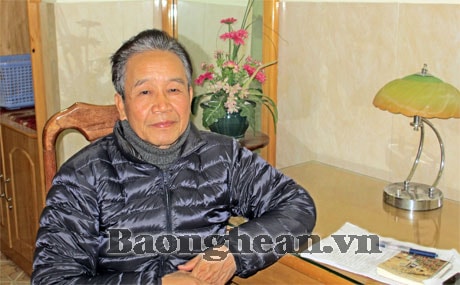"To be successful today, I also had to work for money to buy books"
Professor - Doctor of Science, Vietnam's leading botanist Nguyen Nghia Thin was born in 1944, in Thanh Chi commune, Thanh Chuong district. He is currently a senior lecturer at Hanoi National University, Chairman of the Biology Council of Hanoi National University, Vice Chairman of the Vietnam Botanical Association. Professor Nguyen Nghia Thin had an intimate conversation with Nghe An Newspaper reporters about his life, career and hometown.
(Baonghean)Professor - Doctor of Science, Vietnam's leading botanist Nguyen Nghia Thin was born in 1944, in Thanh Chi commune, Thanh Chuong district. He is currently a senior lecturer at Hanoi National University, Chairman of the Biology Council of Hanoi National University, Vice Chairman of the Vietnam Botanical Association. Professor Nguyen Nghia Thin had an intimate conversation with Nghe An Newspaper reporters about his life, career and hometown.
- Professor! It is known that you were born in Thanh Chuong - the homeland of "salty pickles and sour eggplants". Could you tell us a little about your process of hard work and striving?
- I was born into a farming family with 4 siblings and had a rather difficult childhood. During my primary and secondary school years, I had to go to school and herd buffaloes, collect firewood, pick peanuts, pick rice... When I was in high school, I studied at Do Luong 1 School (now Do Luong 1 High School). To achieve the success I have today, I also had to work for hire to have money to buy books. After that, I passed the entrance exam to Hanoi University of Science. When I was in high school, I was very interested in Math, Physics, Chemistry and wanted to study these subjects in depth, but when I entered university, I was assigned to study Biology. At first, I felt bored, but then a senior advised me that I should consider it an advantage, because in Vietnam at that time, Biology was not yet developed and there were very few valuable research works, especially on tropical plants. This advice helped me to clear my mind to focus on studying. Right in the first year, I was suggested by the teachers to participate in some scientific topics of the faculty and have been passionate about scientific research ever since. In 1966, after graduating from university, I was retained as a lecturer. In 1969, in response to the practical need to find sources of wild vegetables and medicinal plants to serve the troops in the Southern battlefields, I volunteered to go to the Central Highlands battlefield.
During my 4 years in the battlefield, I successfully completed the project: "Research on edible wild vegetables to serve soldiers in the Central Highlands battlefield", which was highly appreciated by the Quartermaster Department (Ministry of Defense). In 1975, I was sent to Bulgaria to do research and in 1980 defended my PhD thesis at Sofia University, majoring in Botany. In 1991, I was promoted to Associate Professor, then defended my PhD thesis in Science (1996) and was promoted to Professor (2002). To date, I have had 40 scientific research projects and topics, of which 12 have been widely applied in practice. Among them, there are 2 projects carried out in Nghe An province: "Assessing plant diversity in Pu Mat Nature Reserve, Con Cuong, Nghe An" (1999 - 2000) and "Investigating plant diversity on limestone mountains in Pu Mat and determining priority areas for conservation work with local people's participation" (2000-2001).
- How do you evaluate the diversity and potential of flora in Nghe An?
- For many graduate students or researchers from Nghe An, I often encourage them to conduct research projects on the flora in the Western region of Nghe An. It can be affirmed that the flora in Nghe An is very diverse and rich, including many medicinal plants, rare and valuable timber trees with high practical value such as dog blood tree, yellow tree, pine tree... However, through the works of my students, I know that currently these tree species have not been properly recognized by the authorities, so they have not been protected and exploited properly. Besides, through guiding and helping students and graduate students in Nghe An to conduct scientific research projects, I realize that Nghe An still lacks or has not promoted the role of biological experts. These are realities that need to be recognized correctly to have a solution.
- Professor, please tell us your feelings about the upcoming meeting of intellectuals and artists from Nghe An?
- This meeting is really meaningful, helping scientists like us have the opportunity to meet and share about the tradition of learning of our homeland and the pride of being children of Nghe; at the same time, it has a great motivational effect on intellectuals and artists of Nghe across the country so that they can contribute more and make more practical contributions to their homeland and country. In my opinion, such meetings should be held regularly and not only at the provincial level but also at the district, city and town levels.
Thank you very much, professor!
Minh Quan (performed)






